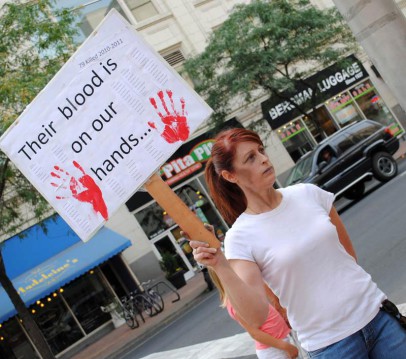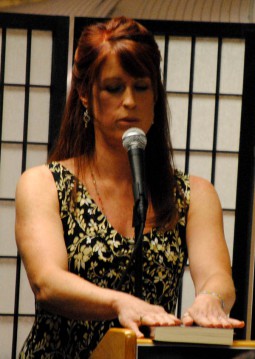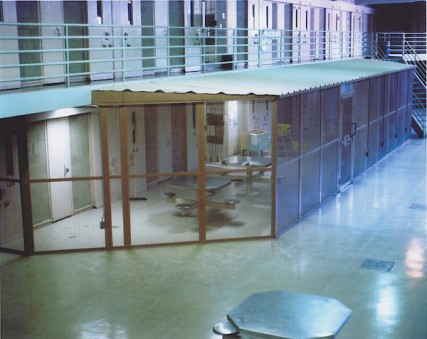They stand in front of River Park Square, shackled together, heads down, nameplates dangling around their necks, bearing the names of men and women killed on America’s death row.
Cal Brown.
Teresa Lewis.
Cameron Todd Willingham.
Behind them, stands Victoria Ann Thorpe. Dark makeup paints her cheeks and she waves a bloodstained-painted sign above her head, “Their blood is on our hands.”

Somehow, despite Thorpe’s gory exterior, she’s approachable.
“Would you like information on the death penalty?” she asks shoppers as they exit the mall, unable to avert their eyes from the scene in front of them. She hands them a clipboard and one-by-one Spokanites fill out postcards showing their support to abolish the death penalty in Washington. The cards will later be sent to state legislatures. The group’s also protested at Gonzaga University and so far has collected more than 200 signatures.
Other passersby wave her away. Some argue.
“The bible says eye for an eye,” says one man, clutching a Frank Peretti novel.
“I understand sir, but…”
He interrupts, anger rising, “If you want to let them all go then you can’t complain when they come into your house and kill you!”
He storms away.
What the man doesn’t know is that Thorpe’s older sister, Kerry Lyn Dalton, has been on California’s death row for almost 18 years.
“Vickie, I been arrested for something — something real bad…You’ll see it in the paper but don’t believe it! Not any of it!,”
Thorpe remembers when she got that phone call in 1992.
Kerry, a methamphetamine addict, had called for help before. But this was different. Her words were mumbled. Her voice was nasally. She was hysterical. “They say I — I — I killed someone.”

Thorpe writes about the phone call in her new book, “Cages” where she tells the story of her troubled childhood and her sister’s murder trial. She also writes about her own spiritual transformation. Once a “Bible toting right-wing Christian…(who) wore long loose dresses and sensible shoes,” Thorpe now sees herself as a survivor of spiritual abuse, forging her own divine path.
“Women were worthless in my family, absolutely worthless,” she recalls.
There’s no evidence of her fragmented confidence when Thorpe speaks publicly about her sister, about “Cages” or about the injustices of the death penalty. With a tender smile she responds to all questions and contentions.
No, she says, the death penalty isn’t a violent crime deterrent.
No, she says, life without parole isn’t more expensive than executions.
No, she says, her sister didn’t kill Irene (“Melanie”) Louise May.
In “Cages” Thorpe explains that her sister was sentenced to death for torture-murder on hearsay. There was no crime scene. No evidence. No dead body.
According to court records, Dalton allegedly killed May using a cast-iron frying pan, a knife and a syringe filled with battery acid.
Thorpe, who spent three years writing “Cages” and has re-read the 4,000 page transcript again and again, maintains that her sister was wrongly accused as a way to get attention off the San Diego Metropolitan Homicide Task Force, which had been unable to solve a series of serial murders in the area.

“By the end of the book I think there should be a sinking feeling of ‘oh, wait a minute, how’d they convict her?’,” Thorpe says.
Dalton is still waiting her first appeal.
“My viewpoint used to be that the system was wonderful and perfect and only out for justice,” she says. “I thought the district attorney was the truth seeker. And I thought prosecutors were looking for the truth, nope.”
Thorpe, of course, wants her sister’s case re-examined. But, she says, even if her sister were guilty, “I wouldn’t want her tortured in a cage, waiting to be killed, like she is now.”
And Dalton literally is living in a cage. She lives in it with 19 other women at Central California’s Women’s Facility (though some of the women sleep outside of the cage because of space limitations). It was built in 1991 when the first women were sent there to await execution. It’s nine cells with a ‘cage’ over it.
“It’s just like a zoo cage. It’s heavy mesh with a metal roof. Nobody goes in, and nobody goes out,” Thorpe described.

The death penalty is legal in 33 states, including Washington, which has seven people “on the row.”
Since 1992, 15 death row inmates have been wrongfully accused and released back into society, according to The Innocence Project.
Thorpe says there are numerous innocent people in prison, but says that’s not the only reason why she wants the death penalty abolished.
She says the death penalty is an evil that ruins lives by promoting revenge.
‘The death penalty doesn’t work, we cannot reconcile the past,” she said. “It stigmatizes the convicted as monsters, allowing us not to think of them as humans, taking away the guilt…and allowing the state to kill another human being.”
Jesus, she said, wouldn’t stand for such a thing.
“Nothing that he did or said can be manipulated into harshness. He’s an example of a loving human being,” she said, adding that people need to learn a convict’s story, before judging them. “I believe good is at the heart of everything and love is at the heart of everything and pain and hate comes from hurt and injury.”
Thorpe, along with the Safe and Just Alternatives organization and The Inland Northwest Death Penalty Abolition Group, is seeking to replace the death penalty in Washington with life without parole through legislation.
In November, California voters will decide whether to replace the death penalty with life in prison without the possibility of parole.









Dennis – if your’e reading this, I apologize that the comment you last night on this story has mysteriously disappeared. I’ve asked our tech team what’s going on and where it went. I thought you raised some interesting points and am disappointed readers can no longer see it….
Hopefully we’ll get this fixed soon.
Tracy, this is a beautiful story and really nice photos, too!
Thanks Amanda!
And what about Irene May? What about her inhumane treatment? I guess we can all just forget about that horrible little tidbit.